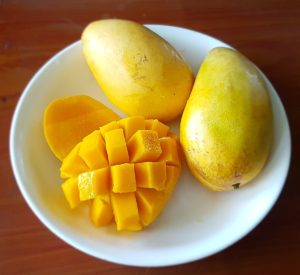 As women age, they may try all sorts of things to reduce or prevent facial wrinkles. A recent study from the University of California researchers suggests that eating 1/2 cup (85 g) mangoes four times a week may reduce facial wrinkles in older fair-skinned women. Unexpectedly however, 1.5 cups (250 g) four times a week for 16 weeks had the opposite effect - it increased facial wrinkles!
As women age, they may try all sorts of things to reduce or prevent facial wrinkles. A recent study from the University of California researchers suggests that eating 1/2 cup (85 g) mangoes four times a week may reduce facial wrinkles in older fair-skinned women. Unexpectedly however, 1.5 cups (250 g) four times a week for 16 weeks had the opposite effect - it increased facial wrinkles!
Why would it have that effect? The researchers thought that probably the carotenoids, flavonoids, and antioxidants in the Ataulfo mangoes had the beneficial skin effect in the 1/2 cup group. [Note: Other fruits also contain these.] But that perhaps the high levels of sugar in the 1.5 cup mango group had a negative effect on the skin ("increased sugar intake may have led to glycation of collagen fibers, thereby disrupting the collagen structure" of the skin).
However, cardiovascular measures were better in the higher mango intake group, such as lower cholesterol and lower blood pressure. Keep in mind though, that only 36 postmenopausal women (between the ages of 50 and 70) participated - so all the results can only be considered "preliminary".
Bottom line: Eat a variety of fruits - they are healthy for you! Research suggests that fruit, in general, is good for the skin. But perhaps eat mangoes in moderation.
From Futurity: Can eating mangoes reduce women's facial wrinkles?
Mangoes, like other orange fruits and vegetables, are rich in beta-carotene and provide antioxidants that may delay cell damage. A new study from researchers at the University of California, Davis, finds eating Ataulfo mangoes, also known as honey or Champagne mangoes, may have another benefit—reducing facial wrinkles in older women with fairer skin. The study was published in the journal Nutrients.
Postmenopausal women who ate a half cup of Ataulfo mangoes four times a week saw a 23 percent decrease in deep wrinkles after two months and a 20 percent decrease after four months.
"That's a significant improvement in wrinkles," said lead author Vivien Fam, a doctoral student in the UC Davis Department of Nutrition. But the findings are very specific and come with a caveat.
"Women who ate a cup and a half of mangoes for the same periods of time saw an increase in wrinkles. This shows that while some mango may be good for skin health, too much of it may not be," Fam said.
Researchers said it's unclear why consuming more mango would increase the severity of wrinkles but speculate that it may be related to a robust amount of sugar in the larger portion of mangoes.
The randomized clinical pilot study involved 28 postmenopausal women with Fitzpatrick skin types II or III (skin that burns more easily than tans). Women were divided into two groups: one group consumed a half cup of mangoes four times a week for four months, and another consumed a cup and a half for the same period of time. Facial wrinkles were evaluated using a high-resolution camera system.
"The system we used to analyze wrinkles allowed us to not just visualize wrinkles, but to quantify and measure wrinkles," said Robert Hackman, professor in the Department of Nutrition and corresponding author of the study. "This is extremely accurate and allowed us to capture more than just the appearance of wrinkles or what the eye might see."
The study looked at the severity, length and width of fine, deep and emerging wrinkles. Fam said the group that consumed a half cup of mangoes saw improvements in all categories.
Fam said further research is needed to learn the mechanisms behind the reduction in wrinkles. She said it may be due to the beneficial effects of carotenoids (orange or red plant pigments), and other phytonutrients that could help build collagen.
